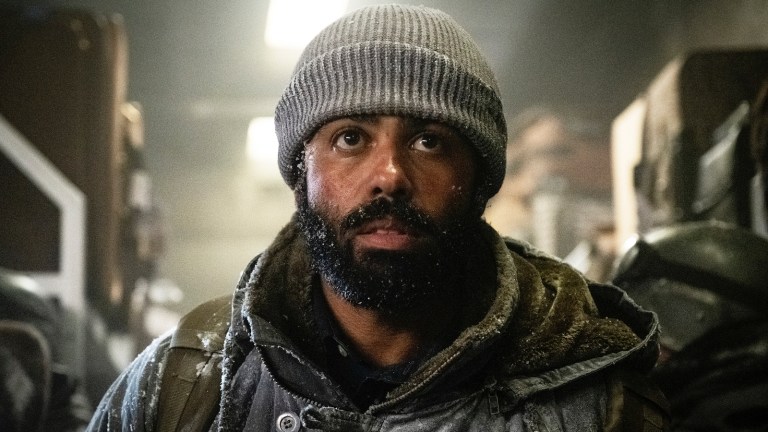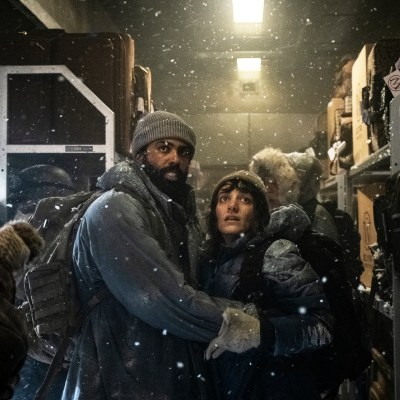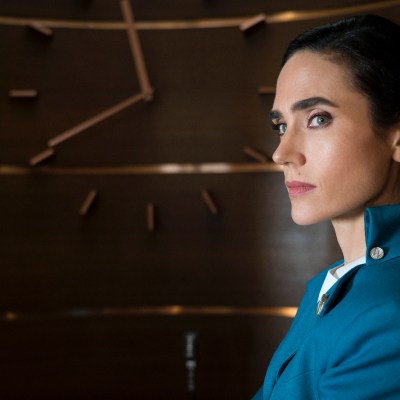Snowpiercer: Surviving in the Tail
Snowpiercer star Daveed Diggs talks about what it takes to overcome the inequalities aboard a train containing humanity’s last survivors.

This interview contains spoilers from the Snowpiercer premiere.
Depending on which car a character inhabits aboard the titular train of TNT’s Snowpiercer, there are going to be very different definitions of what constitutes “survival.” For Andre Layton, the show’s male lead played by Daveed Diggs, only the bare minimum needs have been met until the day outlined in the series premiere when he was called forward to investigate a murder. We spoke to Diggs about life in the poorest section of the train and what we can expect out of Layton in the episodes to come.
DEN OF GEEK: The Snowpiercer premiere gives us the historical context of Layton and the others storming the tail of the train as stowaways. How does that inform their culture and your character?
DAVEED DIGGS: That context is important in a couple of ways. One is that it informs a little bit the rest of the train’s tendency to hate these people, even if it is in a minor way. Once the resource system is closed — we’re on this train; this is all that’s left — if you’re not in the tail, you might reasonably believe that these are people who did not do the necessary preparation to board the train, and yet here they are anyway draining some of our very necessary resources.
For my character and from the perspective of the tail, we had as much of a right to life as anybody else and were doing what we could do to try and make it on what was going to be the only surviving vessel of this event. And the important thing I think that says about who Layton is is his concern for survival, not necessarily for himself but for his family and for the people he considers his people, is really at the forefront of his mind at all times. It was seven years ago when they boarded the train, and it is now.
When we meet Layton, there’s revolution talk going on, and Layton is the one being like, “Wait, wait, wait! We don’t know enough, and every time we try this, a lot of people die. If we knew more, we could maybe do it better. We could maybe actually be successful!” He’s not a fan of unnecessary loss of life, and he’s very future-focused. He’s always trying to figure out how to make the world a better place for the future, and I get the sense of him that the reason he is still alive — because he’s always putting his body at risk — is because at some point it has become clear to him that it is better for the future for him to be alive at this moment. But if at any point that changes, he’s totally ready to die.
Is that cautiousness a characteristic of his that we should keep in mind as Snowpiercer moves forward in case those circumstances do change?
Yeah, I think it is important to remember the things that Layton says at the beginning because everything that is foundational about Layton is challenged over the course of this show, and it’s challenged by gaining more information and then eventually by gaining more power really. You couldn’t help but gain more power than he did in the tail by virtue of being out.
Most belief systems are easy to have when they are not challenged, when your vision is relatively narrow, and sometimes one of the most challenging to you believing that something is true is information. And I think with Layton and with Melanie — these two people really understand the currency of information and are constantly shifting. Their beliefs become less and less foundational as they gain more and more information because of the relationship between those two things.
On a more superficial level, how delicious was that grilled cheese that Layton received upon his release from the tail? You really sold that!
I’m so glad! It is my favorite scene maybe of the season as written. You know, one of those actor-y moments. Like, “Oh, what a cool thing to get to do!” What I haven’t done since then is eaten a grilled cheese. We did so many takes of that, and I had to eat the whole sandwich and drink the whole bowl of soup and everything — no spit buckets, no nothing! So I haven’t been able to enjoy a thing that I did, until that day, very much enjoy.
What would you say to those who might mistakenly believe that the murder Layton has been asked to investigate is going to be the central conflict of Snowpiercer?
The murder mystery aspect is a convenient — and some might say too convenient although I don’t think so; I love a murder mystery, it works — a convenient way to get us out of the tail and to have a character like Layton who has access to the whole train. It sort of allows us to discover things, and that’s the real function of the murder mystery elements of it. But it’s really what Layton uncovers from that point forward that is what the show is really about.
Once Layton leaves the tail, is there the danger that those left behind might see him as a betrayer like Zarah rather than an infiltrator?
Absolutely! I think it’s something a lot of folks relate to. Not a ton of people where I was from went away to college, and I went to the East coast. And then I was just gone from my community for four years, and it feels different when you come back. You not only have had experiences that nobody else in your community has, so you are changed, but also they can’t necessarily understand the change in your frame of reference because this place is now different; you missed the gradual change at home… It can lead to some uncomfortable feelings.
And in this very heightened world, obviously where the stakes are a good deal higher than what your friends are going to think when you come back from college, this idea of being a traitor is pretty prevalent throughout the tail as it speaks to Layton. And Layton holds some of those beliefs about Zarah early on.
Whether or not Layton actually succeeds in his infiltration remains to be seen, but the groundwork has been laid in the opening week of Snowpiercer for a rousing adventure either way. Continue following Digg’s character and the series at large by tuning in to TNT each Sunday night at 9/8c.


